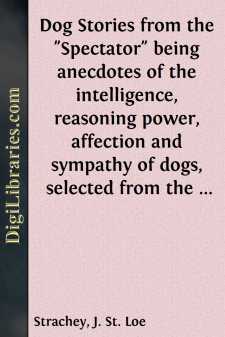Categories
- Antiques & Collectibles 13
- Architecture 36
- Art 48
- Bibles 22
- Biography & Autobiography 813
- Body, Mind & Spirit 142
- Business & Economics 28
- Children's Books 17
- Children's Fiction 14
- Computers 4
- Cooking 94
- Crafts & Hobbies 4
- Drama 346
- Education 46
- Family & Relationships 57
- Fiction 11829
- Games 19
- Gardening 17
- Health & Fitness 34
- History 1377
- House & Home 1
- Humor 147
- Juvenile Fiction 1873
- Juvenile Nonfiction 202
- Language Arts & Disciplines 88
- Law 16
- Literary Collections 686
- Literary Criticism 179
- Mathematics 13
- Medical 41
- Music 40
- Nature 179
- Non-Classifiable 1768
- Performing Arts 7
- Periodicals 1453
- Philosophy 64
- Photography 2
- Poetry 896
- Political Science 203
- Psychology 42
- Reference 154
- Religion 513
- Science 126
- Self-Help 84
- Social Science 81
- Sports & Recreation 34
- Study Aids 3
- Technology & Engineering 59
- Transportation 23
- Travel 463
- True Crime 29
Dog Stories from the "Spectator" being anecdotes of the intelligence, reasoning power, affection and sympathy of dogs, selected from the correspondence columns of "The Spectator"
Categories:
Description:
Excerpt
INTRODUCTION.
I.
The following Dog Stories are taken from the pages of the Spectator, with the permission of the editors and proprietors. It was suggested to me by Mr. Fisher Unwin that the many strange and pleasant stories of dogs which from time to time are sent to the Spectator by its correspondents would, if put together, form a volume of no little entertainment for all who love dogs, or are interested in stories of animal intelligence. Up till now the Spectator dog stories, after the week of their publication, have practically been inaccessible to the general reader; for he is a bold man who will attack a bound volume of a newspaper in search of amusement. Though I at once agreed that the suggested book would be a very readable one, and likely to please dog-lovers all the world over, I did not, till the selection was nearly made, realise how much the stories gain by being grouped together. A single story of a clever dog may amuse, but it is liable to be put aside as an accident, a coincidence, a purely exceptional circumstance which proves nothing. If, however, instead of a single story we have half a dozen illustrating the same form of intelligence, the value of the evidence is enormously increased, and a collection of dog stories may become of very great value in determining such questions as the power of dogs to act on reason as well as on instinct, or their ability to understand human language. The solution of these problems is, I cannot help thinking, materially advanced by the stories in the present book. Take, again, the group of stories which I have labelled Purchasing Dogs. One sample of this kind might, as I have noted above, be put off as a case of imperfect observation, or as a curious coincidence; but when we get a whole group of stories it becomes very difficult to doubt that dogs may learn the first principles of the science of exchange. The Italian dog (page ) which did the narrator a service by fetching him cigars, demanded payment in the shape of a penny, and then used that penny by exchanging it for a loaf, was far advanced in the practice of Political Economy. He not only understood and acted on an implied contract, but realised the great fact at the back of the currency. "What are guineas," said Horne Tooke, "but tickets for sheep and oxen!" The Italian dog did not, like a savage, say, "What is the use of copper to me, I cannot eat it?" Instead, he perceived that the piece of copper was a ticket for bread. It should be noted too that this dog, the dog called Hardy (page ) and others, were able to distinguish between the pieces of copper given them. Again, the Glasgow story (page ) shows that a dog can learn to realise that a halfpenny will buy not merely one thing but several things—in fact, that the great advantage of exchange by currency over barter is that it gives you a choice. While on the subject of purchasing dogs, it is curious to reflect how very little is wanted to convert the dog that is able to purchase into a free agent. If a dog can exchange his faculty for cigar carrying or his tricks against half-pence, why should he not exchange useful services, such as guarding a house or herding sheep, and so become self-supporting? Imagine a collie paid by the day, and, when his work was over, receiving twopence and going off to buy his supper. But the vista opened is too far-reaching. One sees down it dogs paid by the hour and by the piece, and then dogs asking for better pay and shorter hours, and, finally, dogs on strike, and dog "black-legs," or "free dogs."
A word should be said as to the authenticity of the stories in the present volume. It is a matter of common form for the evening newspapers to talk of the Spectator dog stories as hoaxes, and to refer in their playful, way to "another Spectator dog." It might not then unnaturally have been supposed that a person undertaking to edit and reprint these stories would have found a considerable number that showed signs of being hoaxes....


